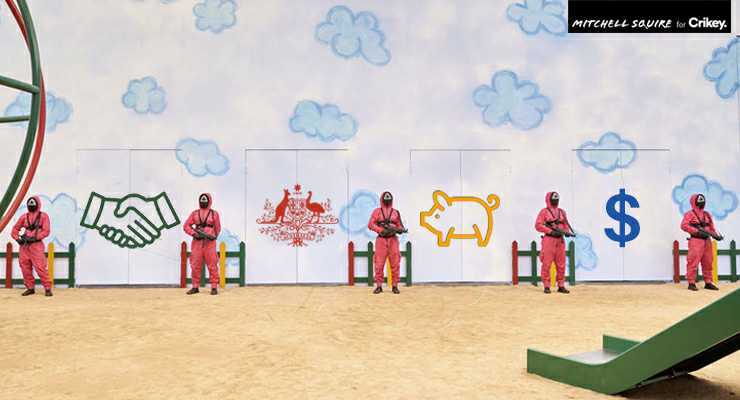
Pork-barrelling through grants schemes has been one of the trademarks of the Morrison government and threatens to haunt its election campaign. Now there is evidence it has overseen an increase in secretive non-competitive grants that can be manipulated to suit its interests.
A report released by the Australian National Audit Office gives some insight into the government’s total grant expenditure over the past four years, and how that funding has changed.
The report analyses more than 108,000 federal grants, worth more than $60 billion, allocated between January 2018 and June this year. While a lot of the data reflects normal government business — legitimate spending on health, local government and aged care — there are also some concerning trends.
First, there has been a clear surge in the use of “closed non-competitive” grants, especially in the lead-up to the federal election in 2019.
These are essentially the most rortable kind, given there is no competitive process as to who wins the government contract — they are made at the discretion of the government.
The report found that between December 2017 and June 2021, 42% of grants (about $25 billion) were awarded through a closed, non-competitive selection process — the biggest category of grant types.
The data also shows a clear spike in grants issued ahead of the 2019 election. And across multiple years, the data shows spikes in “one-off” grants in May — reflecting the desirability to public service departments and ministers to get unallocated or unexpended funds out the door before the end of the financial year.
One-off grants are determined on an “ad hoc” basis, and usually signed off by the minister.
The report also found that more than a quarter of federal government grants designated to the regions since 2018 were awarded to recipients in major cities.
Many grants covered by the report were confidential, with details kept from the public. And the great bulk of those confidential awards were non-competitive. Again, many were entirely legitimate — payments for commercially sensitive activities, for example. But under the cover of confidentiality, it’s hard to make any judgment.
Pandemic spending
One of the other interesting aspects of the report is its breakdown of government spending during the pandemic, including the top 10 recipients of COVID-19 contracts.
In first place was Healthdirect Australia, which received a one-off grant worth $139 million. Next was Qantas with a $70 million grant. REX Airlines came in third, with a closed non-competitive grant of $54 million. Others include Virgin Airlines and Brisbane City Council.








Rorts to the left of me
Barrelin’ to the right
Here I am
Stuck with the Lib-Nats again…
Even without being able to accurately source legitimacy; there appears more than sufficient reason to question the cumulative distribution of ‘closed – non competitive grants’? eg $25 BILLION awarded between Dec. 2017 – June ’21. . . the biggest category of grant types. When one couples figures as identified, with a parliamentary denial of accountability, transparency together; the Australian democratic system of governance, totally an illusion. And our responsible Prime Minister an Illusionist. “Corruption” is a very harsh word. But a nation that either refuses to expose, or declines investigation; then that which none accepts accountability for or, denies transparency, opens everyone to account? No free nation, can survive?
I think the biggest rort hardly mentioned is a new submarine deal awarded with no tender process, no specifications of the new product, no timeline for delivery, no infrastructure to maintain it. in fact, nothing to show for it except for a brown smear on Morrison’s nose and across his face.
Georgina, no matter how we rattle on about rorts, the corruption of this Government ( am being polite in saying that) no matter how much you raise the red flag and man the parapets at the ineptitude, scandilous dealings of this immorality of this Government ( sic) it keeps on running it’s own agenda, it keeps on being the same “without” accountability.
It wastes taxpayer money like it has a free money press and raking up debt ( just go to the Australian Debt Clock) it has no acvountability as most positions that are held by boards that dig into investigating are held by corrupt ex failed Libs appointed by a guy by the name of Christian Porter..”remember him” ?
How long until members of the ANAO get the Bernard Collaery / Witness K treatment as illegal witness blowers? It seems to be the only entity consistently holding any aspect of this Government to account.